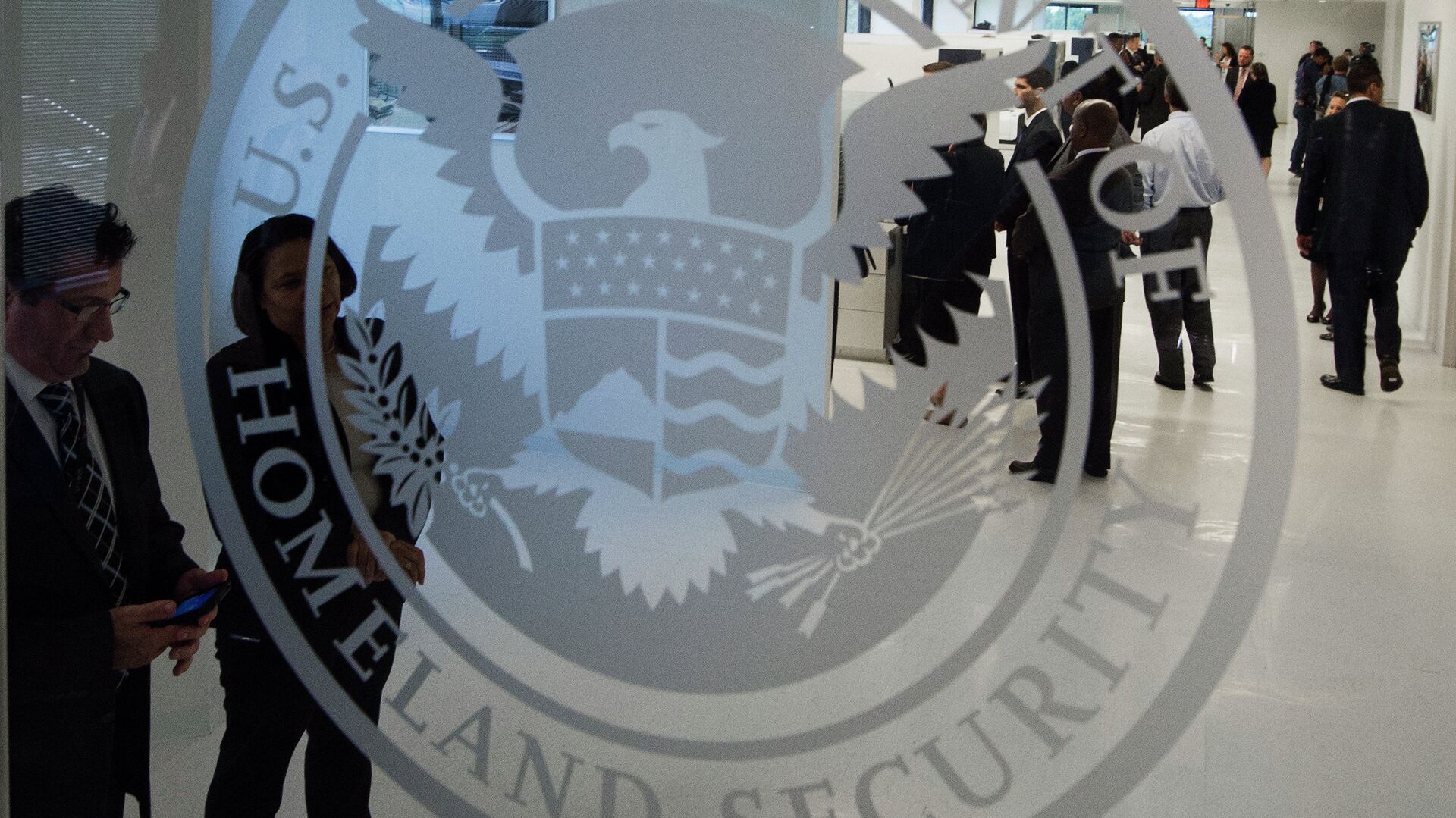https://sputnikglobe.com/20211212/secret-us-govt-unit-arbitrarily-used-sensitive-databases-to-research-journalists-media-claims-1091460948.html
Secret US Gov't Unit Arbitrarily Used Sensitive Databases to Research Journalists, Media Claim
Secret US Gov't Unit Arbitrarily Used Sensitive Databases to Research Journalists, Media Claim
Sputnik International
A secretive US Customs and Border Protection (CBP) unit used government databases to arbitrarily run checks on a number of American NGOs, officials, congressional staffers, and around 20 journalists, including at least one Pulitzer Prize winner.
2021-12-12T14:03+0000
2021-12-12T14:03+0000
2021-12-12T14:05+0000
us
journalism
the associated press
freedom of press
https://cdn1.img.sputnikglobe.com/img/102699/25/1026992556_0:390:2223:1640_1920x0_80_0_0_6061cec3f4740dde9a4bbba57e14872d.jpg
A secretive US Customs and Border Protection (CBP) unit used government databases, including those containing citizens' private information and data on terrorists, to arbitrarily run checks on a number of American NGOs, officials, congressional staffers, and around 20 journalists, including at least one Pulitzer Prize winner, Yahoo News, and the Associated Press reported separately.Both media outlets based their report on a Homeland Security Department (HSD) inspector general probe into the actions of the CBP unit known as the Counter Network Division (CBP is under the purview of HSD). Yahoo News also managed to get an interview with a former agent from this CBP unit, Jeffrey Rambo.Road Paved With Good IntentionsRambo insists that when he joined the newly-established Counter Network Division in 2017, its goals were benign. He was tasked with gathering evidence on companies that might have been utilising cobalt, mined in the Democratic Republic of the Congo using forced labour, to produce consumer goods. The division's agent proposed using academics, NGOs, US officials, and journalists specialising in the topic of forced labour to identify these companies and build a case against them.Yet, he had to "vet" these people to use them as sources, Rambo told Yahoo News, citing an order from his supervisor - Dan White. The Counter Network Division, however, did not bother with setting rules or guidelines for "vetting" its sources, and cross-checked them against all of the US government's most sensitive databases – leading to potential abuse of power, the US media outlets claimed.Dan White described the division as "WOLF", short for "way out in left field" and insisted that it was given leeway to set its own guidelines, the inspector general report purportedly said. Jeffrey Rambo, in turn, reportedly claimed there were no guidelines at all.The CBP itself insisted that the agency, including the division in question, abides by "well-established protocols and best practices", when it vets someone and added that it does not "investigate individuals without a legitimate and legal basis to do so".The Homeland Security Department inspector general apparently did not concur, referring several of the division's members to the Department of Justice for criminal prosecution over misusing government databases, Yahoo and AP reported, citing the obtained report. None of the referred persons has been charged so far.Running Checks for Terrorist Connections on Journalists and Uncovering Their AffairsThe inspector general's report, cited by the two news outlets, sheds light on two cases, where the secretive CBP division used its unregulated access to government databases to "vet" journalists. In one of the cases, the division ran checks on AP and Pulitzer-winning journalist Martha Mendoza, who reported on slave labour in Southeast Asia. It is unclear if the division attempted to recruit her after the "vetting".One of these checks flagged her phone for allegedly being "connected with a terrorist" after the division accessed its records. Rambo's unit eventually vetted Mendoza as a "reputable reporter", the inspector general's report said. The Associated Press responded to the revelation by harshly condemning the government agency for blatantly violating the privacy of one of its reporters.In another case, Jeffrey Rambo ran similar checks on Ali Watkins, a then-Politico reporter, who shot to fame after writing an article about the course of the investigation against Trump's campaign in connection with the Russiagate allegations. She has never written about forced labour, but Rambo claimed in the interview with Yahoo that he still considered recruiting her due to her "access and buzz".Rambo insisted that he hoped to use her to "push stories" and help him "overstate" US enforcement capabilities against the companies purportedly using forced labour. The ex-CBP agent hoped that Watkins' work would force those importing goods with links to slave labour to change their routes, supposedly proving their complacency regarding illegal activities.In the process of Watkins' "vetting" Rambo changed his priorities, focusing instead on her reporting of political scandals in which the journalist had cited anonymous sources, including alleged current officials. By studying her confidential travel records and questioning her about confidential sources in person at some point, the CBP agent uncovered her affair with a security director for the Senate Intelligence Committee, James Wolfe.Watkins' denied Wolfe being her source for any of her stories, but Wolfe was still convicted of lying to the FBI about his connections with reporters and received a two-month prison sentence because of Jeffrey Rambo's actions. This scandal, however, also garnered the attention of the HSD inspector general leading to its investigation and several criminal referrals. Despite this, the CBP's Counter Network Division continues to operate as normal, Rambo alleged in his interview with Yahoo.
https://sputnikglobe.com/20211211/ex-un-expert-bidens-summit-for-democracy-is-sheer-hypocrisy-amid-us-effort-to-persecute-assange-1091443360.html
Sputnik International
feedback@sputniknews.com
+74956456601
MIA „Rosiya Segodnya“
2021
Tim Korso
https://cdn1.img.sputnikglobe.com/img/07e6/03/0d/1093831826_0:0:216:216_100x100_80_0_0_e3f43a960af0c6c99f7eb8ccbf5f812c.jpg
Tim Korso
https://cdn1.img.sputnikglobe.com/img/07e6/03/0d/1093831826_0:0:216:216_100x100_80_0_0_e3f43a960af0c6c99f7eb8ccbf5f812c.jpg
News
en_EN
Sputnik International
feedback@sputniknews.com
+74956456601
MIA „Rosiya Segodnya“
Sputnik International
feedback@sputniknews.com
+74956456601
MIA „Rosiya Segodnya“
Tim Korso
https://cdn1.img.sputnikglobe.com/img/07e6/03/0d/1093831826_0:0:216:216_100x100_80_0_0_e3f43a960af0c6c99f7eb8ccbf5f812c.jpg
secret us government unit, cbp, yahoo, associated press, researching journalists, counter network division, freedom of press in us
secret us government unit, cbp, yahoo, associated press, researching journalists, counter network division, freedom of press in us
Secret US Gov't Unit Arbitrarily Used Sensitive Databases to Research Journalists, Media Claim
14:03 GMT 12.12.2021 (Updated: 14:05 GMT 12.12.2021) The actions of the agents who ran these checks attracted the attention of the Homeland Security Department (HSD) inspector general. After finishing an investigation, the IG referred several agents for criminal prosecution over suspected abuse of power. Yet, none of them has ever been charged.
A secretive US Customs and Border Protection (CBP) unit used government databases, including those containing citizens' private information and data on terrorists, to arbitrarily run checks on a number of American NGOs, officials, congressional staffers, and around 20 journalists, including at least one Pulitzer Prize winner, Yahoo News, and the Associated Press reported separately.
Both media outlets based their report on a Homeland Security Department (HSD) inspector general probe into the actions of the CBP unit known as the Counter Network Division (CBP is under the purview of HSD). Yahoo News also managed to get an interview with a former agent from this CBP unit, Jeffrey Rambo.
Road Paved With Good Intentions
Rambo insists that when he joined the newly-established Counter Network Division in 2017, its goals were benign. He was tasked with gathering evidence on companies that might have been utilising cobalt, mined in the Democratic Republic of the Congo
using forced labour, to produce consumer goods. The division's agent proposed using academics, NGOs, US officials, and journalists specialising in the topic of forced labour to identify these companies and build a case against them.
Yet, he had to "vet" these people to use them as sources, Rambo told Yahoo News, citing an order from his supervisor - Dan White. The Counter Network Division, however, did not bother with setting rules or guidelines for "vetting" its sources, and cross-checked them against all of the US government's most sensitive databases – leading to potential abuse of power, the US media outlets claimed.
Dan White described the division as "WOLF", short for "way out in left field" and insisted that it was given leeway to set its own guidelines, the inspector general report purportedly said. Jeffrey Rambo, in turn, reportedly claimed there were no guidelines at all.
"There is no specific guidance on how to vet someone. In terms of policy and procedure, to be 100 percent frank there, there's no policy and procedure on vetting. When a name comes across your desk you run it through every system you have access to, that's just status quo, that's what everyone does", Rambo reportedly told investigators in the inspector general's probe.
The CBP itself insisted that the agency, including the division in question, abides by "well-established protocols and best practices", when it vets someone and added that it does not "investigate individuals without a legitimate and legal basis to do so".
The Homeland Security Department inspector general apparently did not concur, referring several of the division's members to the Department of Justice for criminal prosecution over misusing government databases, Yahoo and AP reported, citing the obtained report. None of the referred persons has been charged so far.
Running Checks for Terrorist Connections on Journalists and Uncovering Their Affairs
The inspector general's report, cited by the two news outlets, sheds light on two cases, where the secretive CBP division used its unregulated access to government databases
to "vet" journalists. In one of the cases, the division ran checks on
AP and Pulitzer-winning journalist Martha Mendoza, who reported on slave labour in Southeast Asia. It is unclear if the division attempted to recruit her after the "vetting".
One of these checks flagged her phone for allegedly being "connected with a terrorist" after the division accessed its records. Rambo's unit eventually vetted Mendoza as a "reputable reporter", the inspector general's report said. The Associated Press responded to the revelation by harshly condemning the government agency for blatantly violating the privacy of one of its reporters.
"The Associated Press demands an immediate explanation from US Customs and Border Protection as to why journalists including AP investigative reporter Martha Mendoza were run through databases used to track terrorists and identified as potential confidential informant recruits [...] We are deeply concerned about this apparent abuse of power. This appears to be an example of journalists being targeted for simply doing their jobs, which is a violation of the First Amendment", Lauren Easton, AP's director of media relations, said.
In another case, Jeffrey Rambo ran similar checks on Ali Watkins, a then-Politico reporter, who shot to fame after writing an article about the course of the investigation against Trump's campaign in connection with the Russiagate allegations. She has never written about forced labour, but Rambo claimed in the interview with Yahoo that he still considered recruiting her due to her "access and buzz".
Rambo insisted that he hoped to
use her to "push stories" and help him "overstate" US enforcement capabilities against the companies purportedly using forced labour. The ex-CBP agent hoped that Watkins' work would force those importing goods with links to slave labour to change their routes, supposedly proving their complacency regarding illegal activities.

11 December 2021, 17:19 GMT
In the process of Watkins' "vetting" Rambo changed his priorities, focusing instead on her reporting of political scandals in which the journalist had cited anonymous sources, including alleged current officials. By studying her confidential travel records and questioning her about confidential sources in person at some point, the CBP agent uncovered her affair with a security director for the Senate Intelligence Committee, James Wolfe.
Watkins' denied Wolfe being her source for any of her stories, but Wolfe was still convicted of lying to the FBI about his connections with reporters and received a two-month prison sentence because of Jeffrey Rambo's actions. This scandal, however, also garnered the attention of the HSD inspector general leading to its investigation and several criminal referrals. Despite this, the CBP's Counter Network Division continues to operate as normal, Rambo alleged in his interview with Yahoo.





